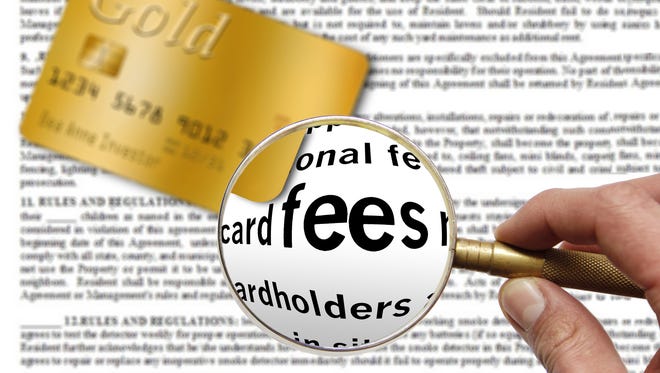Everything has a cost; be on the lookout for these unexpected costs and learn how to prevent them.
These days, hidden costs seem to appear out of nowhere. Sometimes you may find yourself paying for more than you had planned, and for the majority of people, these expenses are usually unexpected. When additional charges aren't readily mentioned up front, it can be very unpleasant. We've compiled a list of some typical hidden fees you might not have been aware you were paying along with the best advice from financial professionals on how to avoid them. Everything has a cost, from setting up autopay for some bills to misplacing the rental car key. Be sure to control those little indulgences that end up costing far more than you anticipated.
Foreign transaction fees
While enjoying yourself while on vacation abroad, you quickly pull out your credit cards. Poor idea. Be especially mindful of the 1–3% international transaction fee that credit cards incur to purchases when traveling abroad. Using cash or a credit card that doesn't charge foreign transaction fees will help you avoid this annoying fee.
Hotel check-in surprise
Popular hotels in tourist hotspots frequently impose necessary resort fees. The costs per night may range from $10 to $30. "Since the cost is not included in the price, most guests are frequently surprised by this. Call your hotel and enquire about fees in advance to avoid a pricey surprise at check-in," advises Smith.
Retirement rip-off
Even a small fee that adds up to 1 percent when funding a Qualified Plan like a 401(k) can add up. The founder and chief wealth architect of the Wealth Factory, Garrett Gunderson, claims that such a little price can lower your retirement amount by 28%. Recognize that expenses associated with retirement plans include administration costs, fund marketing costs (often referred to as 12-b-1 fees or marketing costs), legal costs (set-up costs, admin costs), and expense ratios (which cover the cost of the management even if the manager can't outperform a low- or no-cost index fund). Read the fee disclosure statement that includes the 401(k) investment options if you want to avoid having to pay these costs. This will enable you to decide whether it is worthwhile to investigate a cheaper plan. One of the most frequent errors made when saving for retirement is forgetting about unexpected fees.
Check out your cable provider
According to Gunderson, cable TV providers are raising surcharges to offset their costs even if they claim to be generally holding down their prices. These expenses are incurred by carrying certain broadcast networks like CBS and local sports stations. In any case, if you contact to cancel, cable companies will nearly always renegotiate or reduce the rates of Internet service, cable packages, etc. For instance, I negotiated to reduce mine from $170 a month to $100, says Gunderson.Analyze your cable bill to find out which channels you watch, which ones you don't, and whether you were overcharged elsewhere. Ask for a bundle that includes the channels you use the most. Examine the charges on your bill for additional boxes or your modem. Sometimes you can buy your own modem to replace the one you rent from the cable provider, which will pay for itself in a few months. Learn all of these personal finance tricks you were never taught to avoid hidden expenses.
Sneaky hotel fees
You use your room's minibar at your own risk. Although there may be a pricing list next to the mini bar, occasionally even moving goods in the bar can result in a charge. You might pay more if you order more towels. Before you use or receive more of anything in your accommodation, it's a good idea to inquire about any fees or costs.

Keep your eyes on your keys
Without a question, you're in a positive frame of mind when you're on vacation. Don't worry yourself too much over forgetting your rental car's keys. It might cost $300, and if you misplace your hotel key, it might cost $25 or more.
Blindsided by balance transfer fees
Transferring your credit card's large debt to a new card with a 0% interest rate sounds so easy. However, that chance will cost you a hefty surcharge of 4% in transfer fees. Make sure it's worthwhile to do it and that you can pay off the entire balance during the promotional period because if not, you'll have to pay interest on the outstanding sum, which will negate the benefit you were hoping to receive.
PayPal problematic?
"If you use PayPal to make online purchases, there's a significant likelihood that you'll eventually pay a monthly fee that is deducted from your PayPal account without your knowledge. The majority of the time, when you join up for an online membership or subscription, this is the case, according to Steve Wang, a certified financial adviser and blogger for careers. According to him, businesses take advantage of clients who forget to cancel or who had no idea they were agreeing to a recurring fee by using this payment scheme. Until you take the initiative to cancel them, these costs continue to accrue and can gradually deplete your funds.In terms of tactics, he advises, "Always look at your PayPal payment history. If you notice a weekly or monthly charge that you don't instantly recognize, it's probably a recurring payment. There is a user page in your PayPal account settings where you may control all the recurring payments that are currently active on that account if you want to cancel one.
Home sweet home
Homebuyers should prepare for an absurd amount of closing costs, including inspection fees, title search fees, survey fees, loan origination fees, and other seemingly pointless costs. Wang claims that these are typically unavoidable. However, they are sometimes negotiable, and you should be aware that many of these costs are part of the process of purchasing a new home. Here are some additional unforeseen expenses and fees that first-time homeowners should be aware of.
Careful with convenience
When children first leave home, prepaid cash cards are convenient and a good option. Yet buyer beware. "Nearly all prepaid cards have some kind of activation fee, swipe fee, or monthly maintenance fee," claims Wang. Although they can appear insignificant at first, these fees frequently add up.Also be aware that there aren't many prepaid cards available. Use prepaid cards only when necessary, advises Wang, and make sure to read the fine print or do some internet research to learn about any potential penalties.
Airline tricks
The airlines provide and remove. "Reward point redemption fees are sly. When redeeming reward airline miles, these fees happen most frequently, according to Bobbi Rebell, a personal finance specialist with TransferWise. When applying for a card, using rewards, and when you need a fee waiver, Rebell advises reading the small print carefully.
Out-of-network ATM angst
To access their own money, many Americans must pay fees. Fees from ATMs can pile up. "Using an ATM that isn't connected to your bank typically costs more than $4! ATM fees can be fully avoided with some advance planning. You might be able to locate free ATMs using an app provided by your bank. You can also look about for a different bank without out-of-network fees, advises Tony Drake, CEO and founder of WealthWisconsin.com and a certified financial adviser.
Outrageous overdrafts
"Each time you overdraw, overdraft fees build up to more than $30. By setting up notifications with your bank that will notify you when you are running low on cash, you can fully avoid this additional tax, according to Drake. You can decide not to use overdraft protection, in which case your debit card will not be accepted. Typically, banks provide one grace overdraft. "Call and ask if you may have a fee waived if you are charged. Many banks will perform such action once each year," claims Drake.
Adios annual fees
A yearly fee may be sought after by some banks, but you can avoid it. Consult a banker to see how you might reduce your annual cost because annual fees differ. You might be able to create a savings account in addition to a checking account with some businesses, according to Smith, to avoid fees.
Beware of “free checking”
There are no free meals in life. Undoubtedly, a bank may claim to provide free checking accounts. Investigate more; if you don't fulfill the requirements, such as maintaining a daily minimum balance, there can be a monthly maintenance cost. Look for a financial institution with a low balance requirement, such as $25 or less, if you don't think you'll be able to keep that average.
Buy from the box office
If at all possible, avoid purchasing tickets online from ticket resellers as seeing the best acts and attending major events will already be expensive. Due of the surcharges they throw on, you'll spend more. Purchasing your tickets at the box office is preferable.
Lighten your load
How much does a vacation truly require? Packing less could help you avoid price shock at the airport due to overweight baggage fines. Use the scale in your bathroom to get an idea of your luggage. Lighten up if there is a 50-pound or greater gap between your weight and your weight plus the bag. Of course, you shouldn't follow every advice you receive on saving money.
Remittance racket
One of the worst hidden costs in consumer financial services is with remittances. Financial institutions have historically preyed upon and disadvantageed immigrant labor, who send remittances the most frequently. According to Matt Oppenheimer, co-founder and CEO of Remitly, "They are forced to deal with hefty fees, unfavorable exchange rates, and a variety of hidden expenditures just to transfer their hard-earned money to loved ones who really need it.A typical remittance business, such as Western Union, frequently charges senders a 10 percent fee. Consider using digital transfer services with cheaper costs, reasonable exchange rates, and quicker transmit times, such as Remitly or TransferWise, advises Oppenheimer.
Avoid the hit heading home
You had a good time away, and now you're planning your trip home. You receive a surprise as you pass through customs. You better put up some money if you want to go. Exit/tourist fines are normally approximately $25, which isn't much but can hurt your finances after spending a lot of money. This is especially true if you weren't expecting them. Look for information about exit fees when researching your trip.
Paper is so passé
The use of paper is essentially extinct in the digital age. So, if your bank, stockbroker, or other institutions start to charge you for monthly print statements, don't be shocked. Never fight technology. It's not a big deal to sign up for electronic statements. There will be less paper on your coffee table as a result.


























